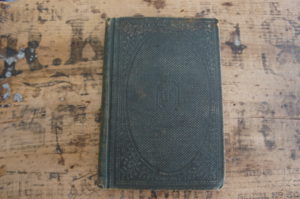Do you watch the Academy Awards? We do at our house. It’s how we get ideas for which movies we want to rent for the next few months. We’ve been working our way through the list of Best Picture nominees and have recently watched Django Unchained and Lincoln. Both pictures take place in the 1800s before the Civil War and at the end of it. Ironically I found a wonderful treasure from the same time period during my antiquing adventures.

You may be thinking that it looks like an ordinary book; an old one but quite ordinary. That’s precisely why you can’t judge a book by its cover. It’s a rare copy of an anti-slavery book for children published in 1859. This mid nineteenth-century, abolitionist tract, distributed by the Sunday School Union, uses actual life stories about slave children separated from their parents or mistreated by their masters to appeal to the sympathies of free children. Vivid illustrations help to reinforce the message that black children should have the same rights as white children, and that holding humans as property is “a sin against God.”
It contains 3 sets of stories about the lives of real slaves and also has a short introduction about the immorality of slavery from a Biblical perspective. I’ve always enjoyed history class but through watching the movie Lincoln I realized I’m just a casual observer on the subject. During my education, history was approached through a series of events and dates and not from the perspective of its participants. I always thought that “everyone” in the North was against slavery and “everyone” in the South was for it. I never realized the political wrangling that went on to get the 13th Amendment passed and that a good portion of the people in the North were against it.

The book contains 10 etchings depicting slave life by Charles Howland Hammatt Billings who also illustrated Uncle Tom’s Cabin. I read this book this week and found it to be quite moving. I absolutely can not believe how despicably humans can treat each other. I can appreciate the way Quentin Tarrantino rewrites history for his movies so the bad guy loses in the end and the good guy triumphs. That’s the way we’d all like it to work. Even though Django Unchained was quite violent and there were parts I could not watch, I do admire his creativity.
I’m so glad that fate had me stumble across this simple and powerful volume and that I took the time to learn from its contents. I plan on selling it on Ebay to someone else who will appreciate it.
That men do not learn very much from the lessons of history is the most important of all the lessons of history.
Aldous Huxley
Did you like history class? Have you seen either Lincoln or Django Unchained?
Leave a Reply